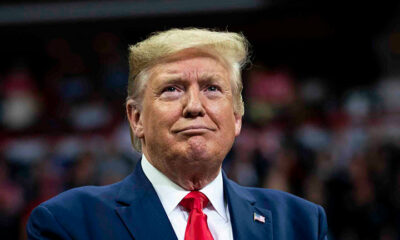Features
Mo! Sibyl: A Tale of Two Countries – Between Nigeria & South Korea
 I have been thinking a lot about Nigeria since I returned from my trip there. This trip was the first I had made in the past seven years I had been away. I moved abroad in 2011, and as a diligent citizen, I carried Nigeria in my spirit, always finding ways to talk about her and promote her inherent goodness to everyone. You might say that I may have left Nigeria but Nigeria never left me and would most likely never will.
I have been thinking a lot about Nigeria since I returned from my trip there. This trip was the first I had made in the past seven years I had been away. I moved abroad in 2011, and as a diligent citizen, I carried Nigeria in my spirit, always finding ways to talk about her and promote her inherent goodness to everyone. You might say that I may have left Nigeria but Nigeria never left me and would most likely never will.
See, like most Nigerians living in the diaspora, I tend to adopt a romantic approach to talking about Nigeria, conflating her positives and almost very selectively leaving out the negatives. For those Nigerians like me, reality sets in when we make the sojourn back home, in the form of reverse culture shock. And this is the phase I currently am in, as I have been reflecting a lot since my short trip back.
There seems to be a mismatch between the people I met and the country they have been provided to live in. For a people so jolly and affable, the harshness and the difficulty of living day-to-day in Nigeria did not seem fair, especially given the ease with which these problems could be solved under the right leadership.
Returning to Nigeria after my protracted absence meant that everything I saw was magnified, especially her social issues, because I now had a base reference to make comparisons. It breaks my heart that after this time (dating from our independence), we still cannot get some basic infrastructures right, like reliable road network, stable power supply, or good drainage systems. Everything in Nigeria reads like a failed system, from the inept, unimaginative, and reductive leaders to the current generation of youths who have been described with words ranging from lazy to lost. We seem to take everything in stride and turn serious issues into memes and gag-worthy jokes, take the example of many hit songs that have been out of the codeine epidemic.
Rather than actively demanding change and accountability from those who serve us, we have instead been made puerile and like those living in a dystopia (we can certainly make arguments to draw such parallels), we play hunger games to survive on a day-to-day basis. And surviving is what we have been doing for so long, so much so that we lack that intellectual space and wherewithal to demand better governance and hold them accountable.
The problem, as I have come to observe, is one with many roots, and chief of this is our lack of understanding of what our civic rights are. Furthermore, those who do not get to travel out of the country (which in itself can be categorized as a source of disparity) are not exposed to a different kind of reality than they are currently used to. I am here to let you know that there is a possibility for a change. What if I told you of a country that we can learn a lot from on how social infrastructures can be made better and economic and social disparity gaps observed can be made narrower?
I am here today to make you all see the Republic of Korea (aka South Korea) in a different light. I picked this country as a prime example not only because of how much it means to me (I speak their language for starters) but because her beginnings are a subtle reminder of Nigeria’s and I am hoping that in the nearest future we can share the same gains South Korea now enjoys. You cannot learn about the history of Korea and not get excited about it — it is a story of triumph (relatively). Before I share on what our country, Nigeria, can learn from South Korea, let us begin with a bit of history (some parallels might be drawn here for emphasis’ sake) here.
History
The Korean Peninsula went from being under a heavy Japanese rule from 1910–1945 to a defining war five years later (between 1950–1953). Then, the watershed moment at the 38th Parallel in June 1953 divided the Korean Peninsula into the two diametrical nations that we now know as South and North Korea. Due to this division in 1953, South Korea had all those characteristics of an underdeveloped economy because many of its manufacturing and industrial facilities were concentrated in North Korea. Being cut off from the supplies of North Korea also meant that South Korea’s economy was no longer self-sustaining as more than 90% of electricity was generated inside North Korea. Therefore, in the 1960s, North Korean citizens had a higher standard of living due to a more buoyant economy. However, this was short-lived as the collapse of the Soviet Union weakened North Korea’s economy. Today, one of the most significant indicators of wealth among the elite in Pyongyang, North Korea is an electric rice cooker. However, today, South Korea’s economy is light years ahead that of its neighbor: Its economy is 38 times larger than the North’s (2011/2014 GDP total estimate of $1.755 trillion vs. $40 billion) and with an international trade volume 224 times larger.
What then can Nigeria learn from Korea? I summarize these points below:
Saemaul Undong /새마을 운동/
“To solve Africa’s problem of poverty, Africa must adopt Korea’s Saemaul Undong as its role model.” – Barack Obama
When loosely translated, Saemaul Undong means New Village Movement. Park Chung-hee (then president) launched this political initiative in 1970 to modernize the rural South Korean economy. The Movement encouraged self-reliance, community engagement, and cooperation. This Movement also helped with national development and poverty reduction and was credited as the catalyst that helped South Korea transition from aid recipient to donor status– one of the very few countries to achieve this. Perhaps, the most tangible thing to note there was how this Movement changed the mentality of South Koreans from a defeatist one into a more confident one. It injected enthusiasm into Koreans who now believed in a Korea that was worth fighting for.
The Saemaul Undong Movement is one that I think can work well in Nigeria, especially seeing as we already have the social cohesiveness. We sure already love to compete, but this time around we can get to compete together instead of against each other. Rural areas, cities, and under-developed areas can be divided into communities where basic infrastructure can be provided to them to rebuild their areas. Our local government areas (LGAs) can be put to task as the focal points to begin this process of change given how well positioned they already are. LGAs could then be stimulated to produce friendly competition among each other.
If done properly, environmental projects such as bridges, roads, improving water systems, stable electricity, and public amenities can be completed. Working together towards bettering our immediate environment cannot only boost our morale but also create job opportunities for the vast number of the unemployed. Farmers can also be engaged via this Movement by providing resources to them for increasing productions of seeds and raising specialty crops. The Movement is one that has been introduced and implemented in other African countries like Burundi, Cote D’Ivoire, and the Democratic Republic of Congo.
Education, Education, Education
“No one just drops out of school, a student may transfer to another school, but no one just drops out. … To drop out of school is a major disaster, a catastrophe. It wouldn’t happen unless it was unavoidable.” – Chung Chang Yong, Principal, Ewha Girls’ High School.
The state of education in Nigeria leaves a lot to be desired, and there seems to be a huge disparity in educational outcomes between the haves and the have-nots. Education reform is one way, to begin with reimaging a new Nigeria to provide equal opportunities for everyone. In the late 40s, South Korea was extremely poor; however, the government’s priority was on education, even during the war. The South Korean government spent a lot of money in ensuring that schools stayed open, and by the end of the 1950s, the enrollment rate in school was almost 100%, and illiteracy rate among adults reduced significantly.
Today, this once poorly resourced country is now one of the most literate countries in the world, and national spending on education in South Korea is higher than most developed countries. Dropout rates are really low with more than 90% of students graduating from high school on time. South Korean families caught on early that education was a key to escaping from poverty and the main catalyst to succeeding in life. The Nigerian government needs to allocate a higher budget towards education and teachers need to be paid better. Once the educated take power, the possibilities of positive change will be exponential, hereby reducing ignorance and ultimately corruption. Why our government keeps adopting a laissez-faire attitude towards education makes me wonder if it is indeed a deliberate ploy to hold us all back, proving my point of our need for better governance.
Nationalism
“International economists often describe South Korea as the single most impressive example of what free markets, democratic government, and elbow grease can do to transform a small agrarian, backwater into a global powerhouse.” – Escape from Camp 14, Blaine Harden
The average Nigerian has long stopped buying into the Nigerian dream and it does not take a genius to figure out why this is so. When you have government officials who travel abroad to treat easily treatable conditions like Meniere’s disease, it communicates a lack of faith in the Nigerian system. To make the country desirable for all of us, especially for those of us who selflessly want a Nigeria we can someday want to return to, we need to elect officials with a very strong nationalistic interest. Using Korea (in the1950s) as an example, we need to restrict importations and increase local and domestic production. In the 1960s, as Korea did, we could also encourage exportation by providing tax incentives for exporters and tariff waivers for imports of raw materials used in manufacturing products. Our agricultural, food and chemical industries can be engaged by providing loans with low interest rates.
Most of our consumer products are imported in Nigeria mostly because of the substandard quality of the locally-made goods. We need to begin with strengthening production and regulation of consumer products, as these do not require high technology or a huge amount of investment. Korea began with the so-called ‘three white industry’ (sugar, flour, and cotton) which are daily, essential, and heavily-used products. Samsung, the big technology giant, actually began in the sugar business and was Korea’s first sugar manufacturer. It actually started as Cheil Jedang (CJ) and was the original CJ that is widely seen in Korea today. One by one, this import substitution of consumer products was translated to industrial products such as cement, heavy chemical industries, and eventually technology. With consumer goods, the success was a huge one and by the end of the 1950s, almost all consumer goods were produced in Korea. From one industrial product to the other, gradually in 1950s, Korea succeeded in producing domestically and stemming foreign importation.
Most developing countries are not able to make a successful transition from the status of underdeveloped to that of advanced industrialized countries. Therefore, the Korean economic success has drawn worldwide attention. This ‘sudden’ phoenix rise from ashes into a stable, boisterous economy is one of the reasons I love South Korea. In addition to the ample international aids received (which is not unusual in other countries), the citizens were determined to rebuild their country. This kind of intentionality, advancement, and economic boon is what I really wish for my country, Nigeria. Nigeria boasts of a lot of natural resources but still has long ways to go in translating such abundance into improving the lives of its citizens
Developing countries, like Nigeria, can learn a lot from the Korean experience: the concept of utilizing the labor force and human resources expediently and wisely; special emphasis on the importance of education and sustaining this regardless of whatever instabilities (political or otherwise) that might come up; and not just implementing rules but enforcing them and holding everyone equally accountable for them.
The points suggested are not difficult to enforce; but corruption, as with most developing countries, is a cancer that keeps eating deeper. Corruption is not just a problem alien to Nigeria, even South Korea ranks somewhat medial on the Corruption Perceptions Index but compared to Nigeria, corruption is more heavily and routinely criminalized, and there are several checks and balances in both the private and public sectors to curb enthusiastic looters.
A classic example is how the past president, Park Geun-Hye was impeached in 2016 following numerous allegations of corruption and abuse of office. We need to start taking corruption at all levels seriously in Nigeria and stop with its glorification. Moving our nation forward lies on having the right people with more than good intentions. Beyond intentions, we need leaders with a strong sense of nationalism to effect the desired changes, or we keep the status quo with our preponderance of corrupt leaders who pride themselves in keeping the people ignorant while looting public funds. Elections are around the corner, and in no time, the clowns will emerge from the paddocks with promises of sweet nothings stringing us along with empty promises. Let us choose wisely. It begins with getting your PVC today and knowing that your actions (and inactions) determine our country’s direction.
Vote wisely; your vote is your power.
Photo Credit: © Vitalij Sova | Dreamstime.com


















